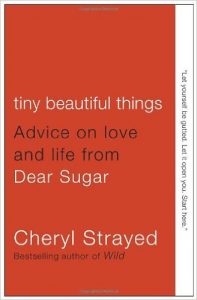From Reading to Human:
Erika Anderson on tiny beautiful things by Cheryl Strayed
On a sunburny afternoon in Prospect Park, I drank apple-ginger soda and talked about death with a man who boxed, followed the zodiac, and read palms. He sang a line from Sade’s song “Maureen” about losing her best friend, “You’ll never meet my new friends.” I told him that a good friend of mine had died of breast cancer. He must not have heard me.
“Breast cancer, wow. But it’s in remission?”
“No, she’s dead,” I said.
We looked at each other for a moment—a long moment, or a short moment that felt long, perhaps because it was utterly absent of intrigue, perhaps because he got it wrong, perhaps because my friend Julia was dead and now he knew. The boxer’s apparently airy way of life—full of astrology and symbolism—both interested and concerned me. It also reminded me of Julia. Julia had told me that she would rather die young than allow a scalpel to slice into her chest. So she died young.
Warning him that I might cry, I read to the boxer/astrologer/palm reader from “Dear Sugar,” the advice column Cheryl Strayed writes for The Rumpus, something she did anonymously until February. The first time I read column #78, “The Obliterated Place,” written by a father whose twenty-two-year-old son was killed by a drunk driver, I did so with my feet on the couch, my knees bent, my chest curled over my laptop, the hood of my sweatshirt pulled over my head. I wailed.
The father, who called himself Living Dead Dad, couldn’t manage a letter, so he wrote a list. He said he was tormented by how he had reacted when his son told him he was gay. “[B]ut how can you not like girls?” he’d said. After the accident the Living Dead Dad can’t bear seeing his son’s former boyfriend with a new man. He asked Strayed, “How do I become human again?”
Strayed told him:
The obliterated place is equal parts destruction and creation. The obliterated place is pitch black and bright light. It is water and parched earth. It is mud and it is manna. The real work of grief is making a home there.
Strayed was twenty-two when her mother—who had left an abusive husband, raised her three children, and attended college in her forties—died from cancer.
It has been healing to me to accept in a very simple way that my mother’s life was forty-five years long, that there was nothing beyond that. There was only my expectation that there would be—my mother at eighty-nine, my mother at sixty-three, my mother at forty-six. Those things don’t exist. They never did.
To discourage the father from imagining what his son’s life would look like were he alive today, Sugar said, “Think: My son’s life was twenty-two years long. Breathe in. Think: My son’s life was twenty-two years long. Breathe out.”
She continued:
My grief is tremendous but my love is bigger. So is yours. You’re not grieving your son’s death because his death was ugly and unfair. You’re grieving it because you loved him truly.
When I read Strayed’s letter aloud in the park, I realized why the death of my friend Julia had hit me like a wall: I loved her truly. A few months after she had discovered the tumor, we sat cross-legged on her living room floor. She looked at me and said, “I think you and I have been sitting like this for centuries.” I nodded my head and cried. When I came home from the park, I borrowed Strayed’s words and repeated them like a mantra: Julia’s life was thirty-three years long.
Strayed also told Living Dead Dad:
Your son hasn’t yet taught you everything he has to teach you. He taught you how to love like you’ve never loved before. He taught you how to suffer like you’ve never suffered before. Perhaps the next thing he has to teach you is acceptance. And the thing after that, forgiveness.
In August, I went to Barnes & Noble in Union Square for a reading of tiny beautiful things, a collection of Dear Sugar pieces. Initially, her words felt rehearsed and corporate, though Strayed broke through the fourth wall with her charm and honesty. When I walked up to her afterward, Strayed said, “I know you. Why do I know you?”
I mentioned the reading she gave in March, when I nestled myself into the crowd at Housing Works for the launch of her memoir, Wild: From Lost to Found on the Pacific Crest Trail. With a live band and a slew of her writer friends reading Dear Sugar excerpts prior to Strayed reading from Wild, it was a raucous celebration. As she did for everyone else who stood in line, she had signed my book, “With wild best wishes on the journey.”
At Barnes & Noble, I had a moment to tell Strayed about my friend Julia. She held my hand and said, “I’m sorry.” In my copy of tiny beautiful things she wrote, “Take the balloon,” which I knew from “Dear Sugar” was a reference to a day in her twenties when she was coming off heroin and a young girl handed her a balloon she didn’t know how to accept.
While no child offered me a balloon in my twenties, what I hear in this directive is “rise.” When I saw Julia a month before she died, she gave me a favorite dress of hers—black cotton interspersed with bands of crochet. Maybe it’s time to wear it again.
~
.
tiny beautiful things
Cheryl Strayed
Vintage
2012
.
.
.Authentic Nike Sneakers | Vans Shoes That Change Color in the Sun: UV Era Ink Stacked & More – Fitforhealth News

